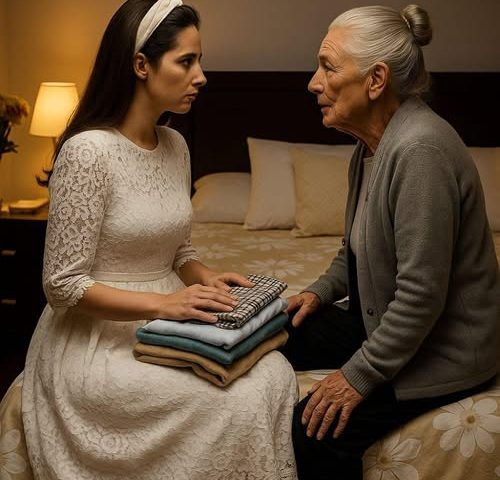The wedding night is often painted as the most blissful moment in a woman’s life. I sat at the vanity, lipstick still flawless, while the distant beat of drums faded into silence. My husband’s relatives had all retired. The bridal chamber glittered with red silk ribbons glowing in golden light. Yet my chest felt heavy, a gnawing dread settling in.
A gentle knock startled me. Who would come at such an hour? I cautiously opened the door a crack and met the frightened eyes of the old maid who had served the family for decades. Her whisper trembled:
“If you want to survive, change clothes and slip out the back door now. Don’t hesitate, there’s no time.”
I froze, blood pounding in my ears. Before I could answer, she widened her eyes and raised a finger to her lips. That look was no jest. Terror surged through me, my hands shaking against the fabric of my gown. And then I heard the sound of footsteps—my new husband’s—drawing near.
Panic overtook me. I tore off the wedding dress, shoved it beneath the bed, slipped into plain clothes, and followed the maid. The chill of the back alley cut through me as she opened an old gate and urged me to run. Her voice faded behind me:
“Straight ahead. Don’t turn back. Someone will be waiting.”
I ran until my lungs burned. Under a dim streetlamp, a motorbike idled. A middle-aged man pulled me onto the seat and sped through the night. Clutching his jacket, tears streamed uncontrollably.
Nearly an hour later, we stopped at a small house on the outskirts. The man guided me inside, murmuring: “Rest here. You’re safe now.”
I collapsed, trembling. My mind reeled: Why had the maid risked everything for me? What horror had I narrowly escaped? Who was this man I had married?
Sleep never came. Every noise jolted me—the bark of a dog, the passing of a car. The man sat smoking on the porch, his face carved in shadows, eyes carrying both pity and unease.
At dawn, the maid arrived. I fell at her feet in gratitude, but she pulled me up, her voice rasping:
“You must hear the truth if you want to save yourself.”
Her words gutted me. Behind the family’s glittering wealth lay criminal dealings and mountains of debt. My marriage had been no romance—it was a transaction. I had been given as collateral.
Worse, my husband was no ordinary man. Violent, addicted, with a dark history. Two years earlier, a young woman had died under suspicious circumstances in that very house. The scandal was hushed up with money and power. The maid confessed: had I stayed in that room, I might not have seen the morning.
I shuddered, recalling his icy stare at the wedding, the bruising grip of his hand. What I’d mistaken for nerves was a warning sign all along.
The man who had driven me, the maid’s distant nephew spoke gravely:
“You cannot return. They’ll search for you, and every moment you delay, the risk grows.”
But I had nothing: no cash, no phone, no papers. My belongings had been confiscated “to avoid distractions.”
The maid pressed a pouch into my hands: a few bills, a worn phone, my ID she had secretly retrieved. I wept, overwhelmed. I had escaped a trap, but my future was a fog.
I called my mother, choking on words. The maid urged me to reveal little, knowing the family would track me. My mother sobbed, begging me to stay alive.
For days I hid in that suburban house, never venturing out. The nephew brought food; the maid maintained her cover at the mansion. My life shrank into shadows. Questions haunted me: Why me? Could I ever rise above, or was I doomed to vanish in hiding?
Then one afternoon, the maid returned, face grave:
“They’re growing suspicious. You must plan quickly. This place won’t be safe much longer.”
That night, she confided that only one thing could end this nightmare: evidence. She had stashed away ledgers and papers—records of the family’s illicit deals. Exposing them would bring justice, but retrieving them was perilous.
We formed a desperate plan. The next night, while she worked as usual, I waited with the nephew outside. When she slipped the documents through the gate, a shadow lunged – my husband. His snarl curdled my bl00d:
“What are you doing?!”
I froze, sure it was the end. But the maid stepped between us, shouting with shaking voice:
“Enough! How many lives will you destr0y before it’s over?!”
The nephew seized my arm, clutching the papers. “Run!”
We fled to the nearest police station, thrusting the ledgers onto the desk. At first, officers doubted my story. But when they opened the files, undeniable evidence stared back: lists of illegal loans, records of under-the-table deals, photographs of secret meetings.
An investigation launched at once. Several members of the family, including my husband, were arrested. The scandal exploded in the press, though my name was shielded.
The maid, injured in the struggle, survived. I held her hands, sobbing:
“You saved my life. I can never repay you.”
She smiled faintly: “All I want is for you to live in peace. That will be enough.”
Months later, I resettled in another city, starting over with nothing. Life remained hard, but at least I was free—no longer trapped under his gaze.
Some nights, memories still claw back, leaving me trembling. Yet gratitude rises too: for the maid’s courage, for the nephew’s help, for my own decision to run.
And I understood a cruel truth: for some brides, a wedding night is the dawn of happiness. For others, it is the start of a fight for survival.
I was one of the fortunate few alive to tell my tale.
